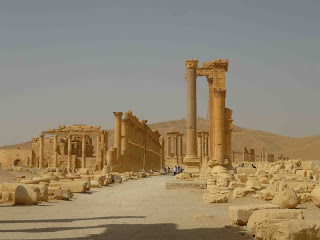
I should mention by now that I have also been a bit of a tourist while in Syria. Before the University course started I have been getting off the beaten track. My first taste of being a tourist was being invited by our newly found Syrian friends to Palmyra, a Roman city north east of Damascus in the desert. It's in ruins but in an excellent state of preservation, so much so that you can still see the main streets with columns and the Temple of Baal. Great, I thought, a good chance to see some history. It eventually came to light that we were travelling first not to Palmyra but to a patch of desert just south of Palmyra and staying the night there before heading to the ruins the next day. Fine, we thought. Then the final surprise was that we were going to be staying in a Bedouin tent there!
So we boarded a mini van (one that was normally used round Damascus - it still had its bus service destinations board on the roof) and headed out at sunset. After going through the suburbs we were suddenly out into the countryside. We managed to see the last glimpses of the terrain around the city before the sun set. Mountainous and dusty, similar to the mountains in Turkey that were a canvas for the clouds to paint. As we sped into the night we overtook lorries from Iraq, Iran and Turkey (Syria is a meeting point for the Middle East). We arrived at a famous cross roads after an hour and a half. Straight ahead led to our destination, Palmyra, left to Aleppo and right to northern Iraq. We turned right! But only to get some gas. Then it was back on the straight road to Palmyra and after more hours we suddenly turned off the road to a desert track and bumped our way into a small village. There were several compounds, surrounded by 12 foot high walls and it was into one of these anonymous compounds we turned. Inside several glistening eyes reflected the light back from the headlights, we were to be staying with about 15 camels!
Inside the compound there were two tents and one outside toilet. Back to nature, back to basics I thought. But inside the tents the modern world had arrived. A TV, fridge and air conditioning at one end of the tent and in the other tent a generator! Bedouin life has caught up with the modern world. The rest of the evening was spent chatting, having a barbecue and not getting too close to the camels. We were spending the night with an honoured guest, a racing camel named The Leader. It was to race in Syria's equivalent of the Camel Grand National in a few week ends time. It looked just like a normal camel to me.

Sleeping in a Bedouin tent conjours up romantic images. However it was one of the most uncomfortable nights I have ever had due to the hard ground (I have no idea how they can just sleep on the ground) and the barking of wild dogs which roamed the desert in packs after dark. We woke at first light and coffee was our only breakfast before we carried on our journey to Palmyra, a desert oasis. We caught glimpses of the ruined city through walls and trees on our way for an American style breakfast with pancakes and more coffee. At the ruins the collonaded main street could be seen along with ground plans of shops and restored theatres and temples. Feeling like proper archaeologists we set about exploring the ruins only for the atmosphere to be shattered by large numbers of tour groups from Italy, France, America and Japan trampling through! However the ruins were very impressive and you could find quiet areas. On one of the surrounding mountains a medieval castle had been built by the Muslim armies (not the Crusaders) and from this we could see the extent of Palmyra as well as the desert beyond stretching as far as the eye could see. Incredible!
On my way back we stopped for tea at another Bedouin tent beside the road complete with a hunting hawk! It was quite sad to return from the emptyness to the business of Damascus and I can see why Bedouins who live in Damascus try to get out whenever they can. There was something peaceful about the desert. You can remove yourself from the modern world and its troubles and in Syria this is important.
No comments:
Post a Comment